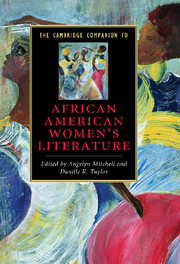Book contents
- Frontmatter
- Introduction
- Part 1 History, contexts, and criticism
- 1 Early African American women’s literature
- 2 Women of the Harlem Renaissance
- 3 Women writers of the Black Arts movement
- 4 Contemporary African American women writers
- 5 African American feminist theories and literary criticism
- Part II Genre, gender, and race
- Bibliography
- Index
3 - Women writers of the Black Arts movement
from Part 1 - History, contexts, and criticism
Published online by Cambridge University Press: 28 July 2009
- Frontmatter
- Introduction
- Part 1 History, contexts, and criticism
- 1 Early African American women’s literature
- 2 Women of the Harlem Renaissance
- 3 Women writers of the Black Arts movement
- 4 Contemporary African American women writers
- 5 African American feminist theories and literary criticism
- Part II Genre, gender, and race
- Bibliography
- Index
Summary
Let uh revolution come. Couldn't be no action like what I dun already seen.”
- Carolyn M. Rodgers (1969)The reimagination of America, the overarching project of the 1960s and 1970s Black Arts movement (BAM), remains its continuing legacy. This project emphasized the discovery that “there is no American literature; there are American literatures . . . [by] those who have their roots in the most ancient civilizations - African, Asian, Mexican [,] . . . Native American . . . [and] the literature of the European settlement regime . . .” This study examines the work of black women writers in poetry, drama, fiction, autobiography, and theoretical essays as it highlights the deep implication and outcomes of that discovery. In Black Fire, the signal anthology of the period, Amiri Baraka and Larry Neal introduce “the founding fathers and mothers of our nation.” The founding mothers, with other vanguard women writers, strengthen the revolutionary ferment of the movement to resonate its themes: a renegotiation of power relations between black and white America, a disturbance of ideological imperatives of identity, and a re-direction of the sources for literary production. They also interject another theme: a renegotiation of the power relations between black men and women - itself a revolutionary advent.
- Type
- Chapter
- Information
- Publisher: Cambridge University PressPrint publication year: 2009
- 1
- Cited by



